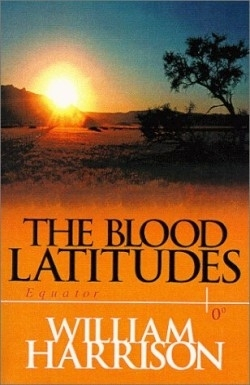The Blood Latitudes
Harrison, a prolific novelist whose books including Rollerblade and Burton and Speke have been turned into films or television shows, returns to a favorite setting—Africa—in this haunting book. The title hints at the brutality in war-torn Africa and the tensions between blood relatives: a father, son and a woman they “share.”
Will Hobbs has spent his career as a journalist living in, and reporting on Africa, spending little time with his wife and only child, Buck, who remained in the States. Now retired, widowed and living in London, Hobbs is not emotionally prepared for a visit by Buck, Buck’s wife, Key and their small son. Buck yearns for his father’s acceptance, but the relationship remains prickly and tense. Buck, a photojournalist, plans to follow in his father’s tracks by taking his camera to African trouble spots. His wife and child are to remain with Hobbs until Buck is settled. Tension mounts even before Buck leaves as Key, enigmatic and seductive, tempts her father-in-law with casual nudity and startling flirtations. Guilt-ridden but enjoying Key’s provocative behavior, Hobbs barely manages to contain his desires.
Word comes that Buck has vanished into the bloody Rwandan landscape. Although torn by Key’s efforts to keep him in London with her and his grandson, Hobbs knows he must search for his son. He allows Key to accompany him only as far as the chaotic and dangerous streets of Nairobi.
Africa has changed for the worse. In his search, Hobbs meets wonderfully original characters-adults and children-who are engaged in the savage civil war: the Bone Man, Joshua Geza, a Peter Panish leader of a band of children; the chilling, but engaging, Papa Ngiza, a Hutu militiaman who was educated at a U.S. seminary. Hobbs becomes Ngiza’s unwilling traveling companion, but finds him full of conversation about history, philosophy, the nature of God and man as he drives about with his thugs, torturing and killing Tutsi children. Hobbs observes: “The world, at best, was in a barbaric twilight.”
Confronted by unthinkable atrocities, and unable to find evidence that Buck is alive, Hobbs returns to Nairobi, feeling like a soldier returning from war. Once there, he realizes his feelings for Key have changed.
Harrison’s Africa and imaginative characters challenge readers to rethink their views about Africa’s problems and latitudes in relationships.
Reviewed by
Linda Salisbury
Disclosure: This article is not an endorsement, but a review. The publisher of this book provided free copies of the book to have their book reviewed by a professional reviewer. No fee was paid by the publisher for this review. Foreword Reviews only recommends books that we love. Foreword Magazine, Inc. is disclosing this in accordance with the Federal Trade Commission’s 16 CFR, Part 255.

